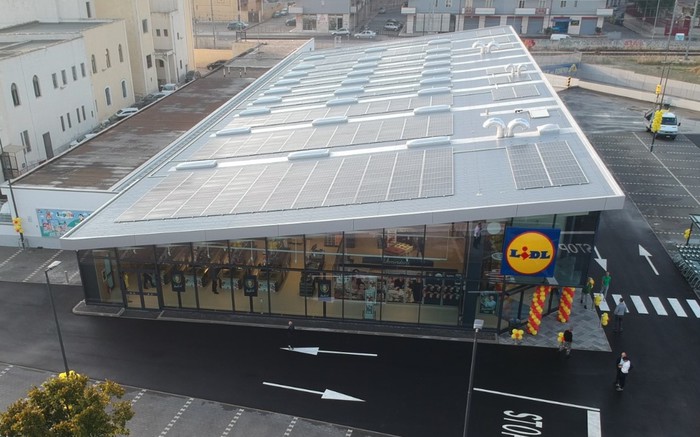Enlarge image
Worker's Fist: Ready for a showdown
The citizens of Germany suffer from inflation and they limit themselves.
Food and energy have risen massively in price.
Consumers react by reducing their consumption, for example by buying fewer clothes.
In June, retail sales fell overall – despite significantly higher prices.
It's a precarious stage win against inflation, nothing more.
The price dynamic is severely reducing purchasing power.
Income insecurity is spreading among wage earners.
According to calculations by the OECD, Germany is one of the western countries where household budgets are shrinking particularly noticeably.
In the first quarter of this year, real income per capita fell by 1.7 percent.
An end to the rapid price increases is not in sight for the time being.
On the contrary: If special measures such as the tank discount and the 9-euro ticket expire in the fall and the planned gas levy comes into force, this will push the inflation rate up even further.
The economists at Commerzbank calculate with an increase of up to three percentage points.
As a result, consumer prices would probably rise by double-digit rates by the end of the year.
There is still plenty of pressure in the pipeline.
The prices that companies have to pay for their inputs are rising far more sharply than consumer prices, most recently by 33 percent year-on-year.
Producer prices have long since been driven not only by expensive energy as a result of the escalating conflict with Russia, but also by supply bottlenecks and shortages of raw materials, preliminary services and capital goods, as the Federal Statistical Office has determined.
Whenever possible, companies will pass these cost increases on to their customers.
It is a time of impertinence.
The coming months will be shaped by the question of who will ultimately bear the costs of this crisis.
Intensified distribution fights threaten - exit open.
There are few arguments for restraint
In the spring, when there was still hope that inflation would subside soon, the parties to the bargaining agreement opted for a combination of one-off payments and moderate wage increases.
A strategy with which the immediate consequences of inflation could be cushioned without further fueling price dynamics.
However, the more the expectation of higher inflation rates in the longer term solidifies, the more likely it is that employees will need strong, permanent wage increases in order not to suffer a loss in their standard of living.
Accordingly, IG Metall is calling for a wage increase of eight percent for the forthcoming wage round in the autumn – not an inappropriate idea, given the expected price increases and the loss of purchasing power that has already been suffered.
There are currently few arguments for restraint on the part of the trade unions.
Many companies make extremely good money.
Many companies already closed the first quarter of this year with a fat plus.
Taken together, the profits of the Dax companies in the first three months were 85 percent above the pre-corona level of 2019, according to the auditing company EY.
After all, two-thirds of companies earned more than 2021, a year that many ended with record profits.
The ongoing Q2 2022 reporting season (watch out for new company numbers next week) shows how differently companies are prepared for the current challenges.
Various corporations are making decent profits, including Mercedes and Volkswagen, Bayer and BASF, because they benefit more from rising prices than they harm them.
Size and market power help.
Others are suffering from collapsing margins, such as the sporting goods manufacturer Adidas, because costs are rising and cautious customers are reluctant to accept price increases.
The companies' ability to cope with wage increases varies accordingly.
But workers are scarce and many positions are vacant.
Why shouldn't work become more expensive?
The question of power and demographics
Despite the fact that the company figures are still good at the moment, there are increasing signs that the economy is reeling into a recession.
Central banks around the world are currently raising interest rates.
The European Central Bank has also belatedly and extremely cautiously switched to a tighter course.
Declared goal: to slow down the inflation dynamic.
However, it is questionable whether this will succeed as hoped.
Shifts in economic structures mean that the downturn will be different this time than it used to be.
Roughly speaking, the usual economic pattern for decades looked like this: Overflowing demand fueled the rise in prices, so that the central banks raised interest rates in order to break the inflationary dynamic.
As a result, unemployment rose;
Wage agreements were moderate with regard to job security.
Now, however, demographics are striking: In aging western societies, the number of citizens of working age is gradually declining.
This decline is being accelerated by the long-term effects of the corona crisis: some employees have left the labor market, for example in early retirement.
At the same time, the pandemic has also slowed down immigration, which has further reduced the supply of workers.
All of these factors strengthen the bargaining power of workers and their unions.
Labor shortages as the norm
It is conceivable that the looming downturn will hardly have a negative impact on the labor markets.
In the past week, the Bank of England has already predicted a deep and long economic crisis for the British economy.
The island economy has been hit particularly hard because it also has to cope with the consequences of Brexit.
But there is no sign of rising unemployment in the UK either .
advertisement
Henrik Mueller
Short-cut politics: How permanent outrage destroys our democracy
Publisher: Piper
Number of pages: 256
Publisher: Piper
Number of pages: 256
Buy for €22.00
price query time
07.08.2022 1.25 p.m
No guarantee
Order from Amazon
Order from Thalia
Order from Weltbild
Product reviews are purely editorial and independent.
Via the so-called affiliate links above, we usually receive a commission from the retailer when you make a purchase.
More information here
Labor shortages could be the new normal, largely independent of the economy.
In Germany, too, the lack of people is still the most important limiting factor in the economy, as surveys by the Ifo Institute show.
Although companies are extremely pessimistic about the near future, they are trying to retain employees and attract new applicants.
Under current conditions, the struggle over who should shoulder the burden of inflation is likely to be all the more intense.
Companies try to pass on increased costs to their customers, while employees struggle to maintain their purchasing power through appropriate wage increases.
Price-wage spirals, as they occurred in many countries in the 1970s and 1980s but hardly played any role in the past era of low inflation rates, would be back - albeit in a new guise, driven by the fundamental scarcity of the production factor Person.
This is an extremely challenging scenario for the central banks.
To what extent they will have to stifle demand in order to achieve the desired price-dampening effects – and what collateral damage such severe braking maneuvers will bring – can hardly be estimated at the moment.
The time of impertinence has only just begun.
The most important economic dates of the coming week
Expand areaMonday
Reporting season I
– Business figures from BioNTech, Porsche Automobil Holding, Siemens Energy, Volkswagen Financial Services, AIG.
ExpandareaTuesday
Reporting Season II
– business figures from Munich Re, Continental, Fraport.
ExpandareaWednesday
Beijing -
Prices in the Far East
- China's statistical office presents figures on inflation trends.
Reporting Season III
– business figures from Eon, Evonik, Sixt, Tui, Leoni, Jenoptik, Aareal Bank, Gea, Talanx, ABN Amro, Deliveroo, Walt Disney.
Expand areaThursday
Copenhagen –
hands full?
– Donor conference #CopenhagenUkraine2022: Representatives from several Western countries meet in Denmark to discuss measures to strengthen long-term arms donations, train the Ukrainian military and mine clearance.
Reporting season IV
– Business figures from Siemens, Deutsche Telekom, RWE, Daimler Truck, K+S, Bilfinger, Thyssenkrupp, Varta, Hapag, Deutz, Ströer, Salzgitter, GFT, ProSiebenSat.1, Zurich.
ExpandareaFriday
Reporting Season V –
Business Numbers from
Jungheinrich, Knorr Bremse, EnBW.















